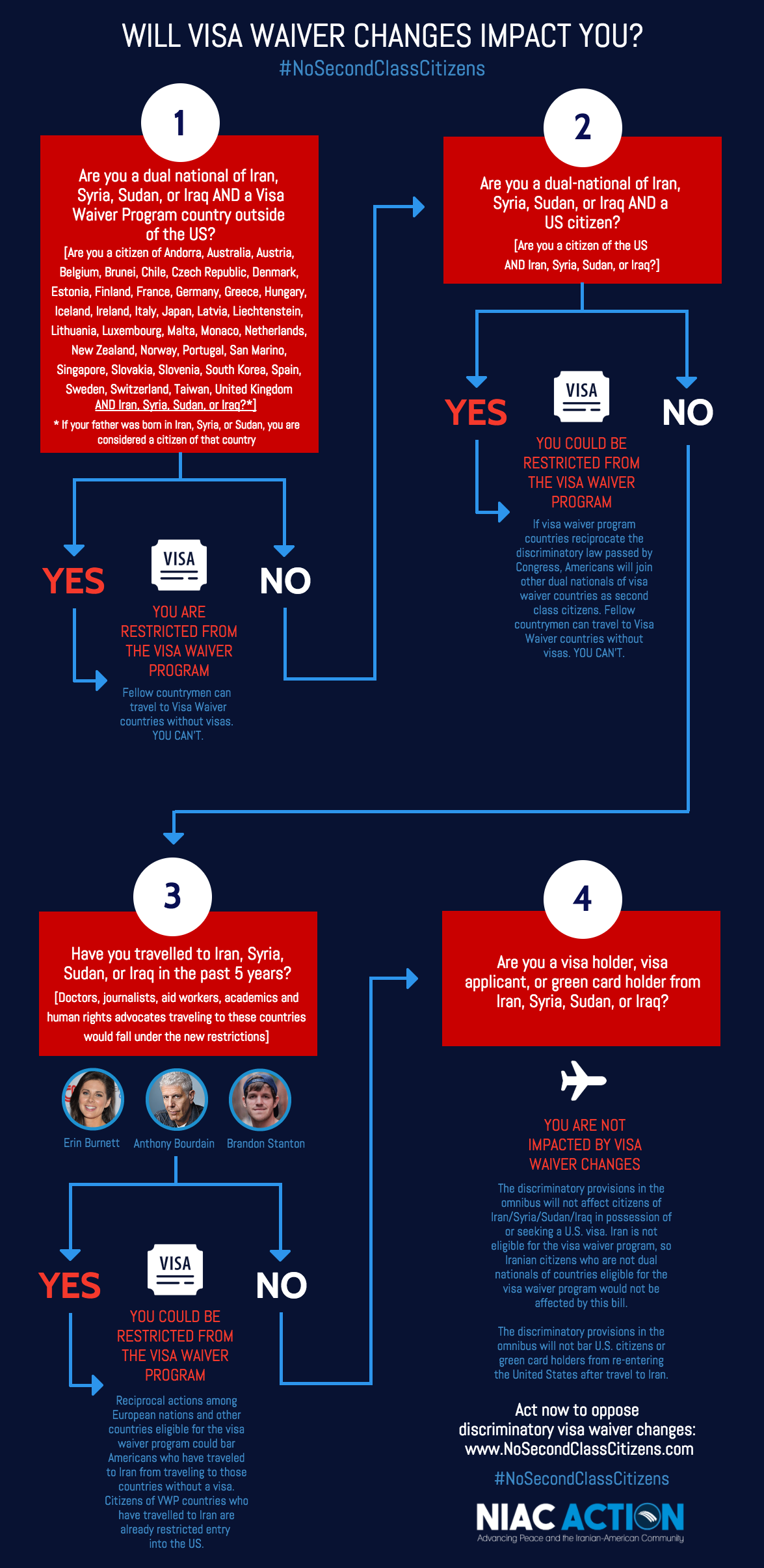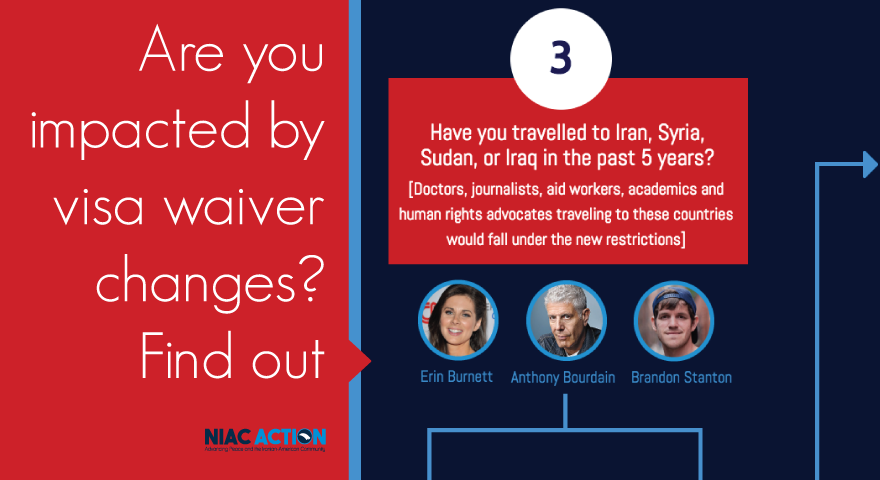
This post is out of date. See our latest FAQ.
On December 18, 2015, President Obama signed into law a massive government-spending bill known as the omnibus appropriations act. The legislation included provisions reforming the visa waiver program, which is the program that enables citizens of 38 countries to travel to the United States without a visa. Despite numerous objections, Congress included discriminatory provisions from a bill that passed the House of Representatives (H.R. 158) to bar dual nationals of Iraq, Syria, Iran and Sudan as well as foreigners who have traveled to those countries since March 2011 from eligibility in the visa waiver program. These measures are now being implemented.
The changes do not directly target Americans, but – because the visa waiver program operates on reciprocity – the visa waiver program countries are likely to respond with reciprocal measures that could render Iranian Americans ineligible for the visa waiver program, effectively creating a second tier of American citizens traveling abroad.
Below are answers to key questions on the discriminatory visa waiver reforms that are included in the omnibus:
How can the visa waiver reform impact Iranian Americans?
Iranian Americans are likely to be directly impacted because the visa waiver program operates on the system of reciprocity. France, for example, has accepted American travelers without a visa because we accepted French travelers without a visa. However, because we barred certain French citizens from the visa waiver program, France can now respond by applying the same restrictions to Americans. As the bill targets dual nationals of Iraq, Syria, Iran and Sudan, it is likely that reciprocal measures would target dual nationals from those same countries living in the United States, including Iranian Americans.
The European Union already has laws in place to expedite reciprocal restrictions in the event that a third country imposes such restrictions on European nationals.
The direct targets of the changes include Iranian dual nationals from eligible countries, as well as non-Iranian nationals from those countries who have visited Iran in the past five years. They would be forced to apply for a visa in order to travel to the United States.
I am an American citizen or green card holder who is planning to visit Iran. Will this affect my ability to return to the United States?
No. The discriminatory provisions in the omnibus will not bar U.S. citizens or green card holders from re-entering the United States after travel to Iran. They would solely affect travel between the U.S. and the 38 countries participating in the visa waiver program. Iran is not eligible for the visa waiver program.
Will the discriminatory provisions in the omnibus affect Iranian citizens in possession of or seeking U.S. visas, or Americans seeking to travel to Iran?
The discriminatory provisions in the omnibus will not affect Iranian citizens in possession of or seeking a U.S. visa. Iran is not eligible for the visa waiver program, so Iranian citizens who are not dual nationals of countries eligible for the visa waiver program would not be affected by this bill.
The visa waiver reforms will not prohibit Americans from traveling to Iran. However, reciprocal actions among European nations and other countries eligible for the visa waiver program could bar Americans who have traveled to Iran from traveling to those countries without a visa.
However, it is possible that further restrictions will be enacted by Congress that specifically target Iranians travelling to the United States, or Iranian Americans who have travelled to Iran.
Do these changes impact Canadians?
No. Canada is not part of the visa waiver program impacted by these new restrictions. Visa-free travel between Canada and the U.S. is permitted under a separate arrangement unaffected by the legislation.
Could the provisions impact the nuclear deal?
Under paragraph 29, the Joint Comprehensive Plan of Action (JCPOA) obligates the United States and other parties to the agreement to “refrain from any policy specifically intended to directly and adversely affect the normalisation of trade and economic relations with Iran.” By barring individuals who have traveled to Iran since 2011 from eligibility in the visa waiver program, many business executives who travel to Iran to explore permissible trade under the JCPOA could be barred from eligibility in the visa waiver program.
While the intent of why Iran was included among countries that would render one ineligible for the visa waiver program is unclear, this could be interpreted as interference with the normalization of trade and economic relations with Iran as permitted under the JCPOA. Iran has protested the visa waiver restrictions and has signaled that it will file a complaint. Amb. Stephen Mull, lead coordinator for overseeing implementation of the JCPOA at the State Department, indicated that very senior officials in the European Union had told both he and Secretary of State John Kerry that the provisions could have a very negative impact on JCPOA implementation. A recent letter from Secretary Kerry to Iranian Foreign Minister Zarif indicated that the administration will implement the visa restrictions in a manner “so as not to interfere with legitimate business interests of Iran,”citing a waiver and other authorities available.
Are we making a difference?
Yes! NIAC Action staff and grassroots leaders have ensured that leading Senators and Representatives are aware of the problems in the bill. This issue was raised at the highest level of budget negotiations, but House Republicans reportedly refused to budge. Fortunately, Sen. Majority Leader Harry Reid (D-NV) has indicated that the provisions were counterproductive and rushed through, and that Congress will take a new look in 2016. Action in the House of Representatives is forthcoming, as well.
NIAC Action grassroots teams and the entire Iranian-American community have been incredibly engaged in this effort, totaling more than 81,000 actions to date, which has given us a fighting chance to repeal the bill.
How do we stop this?
Here’s our plan:
1) We are in communications with the White House and have worked with allies to formally call on the President to waive the visa restrictions on Iranian Americans and travelers to Iran.
2) We are talking to the most senior officials in the EU Foreign Ministry and will formally urge that the EU avoid reciprocal steps that would punish dual nationals and adopt alternative proposals we are developing.
3) We are engaged in serious discussions with Members of Congress to take legislative action to reverse these provisions. New legislative initiatives in the House and Senate will be rolling out in the weeks to come.
